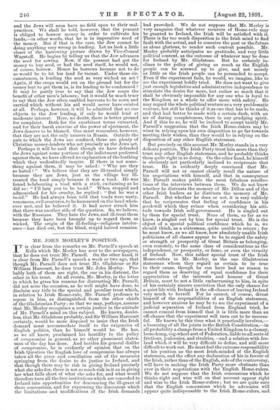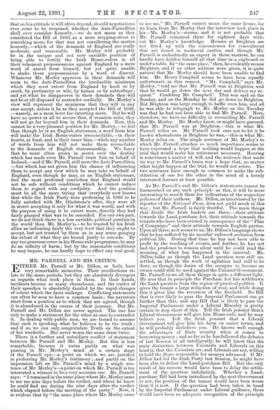MR. JOHN MORLEY'S POSITION.
IT is clear from the remarks on Mr. Parnell's speech at Kells which Mr. Morley has sent to the newspapers, that he does not trust Mr. Parnell. On the other hand, it is clear from Mr. Parnell's speech a week or two ago, that though Mr. Parnell does not trust Mr. Gladstone or Sir William Harcourt, he does trust Mr. John Morley. Pro- bably both of them are right, the one in his distrust, the other in his trust. At all events, Mr. Morley, in the letter in which he gives his reasons for distrusting Mr. Parnell, did not seize the occasion, as he well might have done, to disclaim any title to the special and peculiar trust which, in relation to Irish Home-rule, Mr. Parnell professes to repose in him, as distinguished from the other chiefs of the Gladstonian Party ; so that we may, perhaps, assume that Mr. Morley recognises a certain justice in the attitude of Mr. Parnell's mind on this subject. He knows, doubt- less, that Mr. Gladstone probably, and Sir William Harcourt certainly, would be more disposed to insist that the Irish demand must accommodate itself to the exigencies of English politics, than he himself would be. He has, as we all know, proclaimed his hostility to the policy of compromise in general, as no other prominent states- man of the day has done. And besides his general dislike of compromise, he is evidently of opinion that on the Irish Question the English love of compromise has always taken all the grace and conciliation out of the measures springing from the desire to do justice to Ireland, and that though there may be risk in giving Ireland precisely what she asks for, there is not so much risk in it as in giving her what falls short of what she asks for, and what would therefore turn all the free institutions which are conceded to Ireland into opportunities for denouncing the ill-grace of these concessions, and for expressing the discontent which the limitations and modifications of the Irish demands had provoked. We do not suppose that Mr. Morley is very sanguine that whatever measure of Home-rule may be granted to Ireland, the Irish will be satisfied with it. There is far too much disposition in the Irish mind to find fault with the actual, and to conceive the past or the future as alone glorious, to render such content possible. Mr. Morley probably anticipates no gratitude, and very little political content, as the outcome of whatever may be done for Ireland by Mr. Gladstone. But he certainly in- clines to the policy of giving as much as the English people can be screwed up to give, and not merely as little as the Irish people can be persuaded to accept. Even if the experiment fails, he would, we imagine, like to see the experiment boldly tried. He does not want to give just enough legislative and administrative independence to stimulate the desire for more, but rather so much that it shall be obviously impossible for any one who is loyal to the Kingdom as a whole to offer more with safety. He may regard the whole political venture as a very problematic venture, but still he thinks of it as one that has to be made, and that had better be made with a certain dash, with an air of daring completeness, than in any grudging spirit. And if this be so, he will be inclined to accept tacitly Mr. Parnell's suggestion that the Irish Home-rulers may be wiser in relying upon his own disposition to go far towards meeting their wishes, than they would be in relying on the disposition of any other English statesman.
But precisely on this account Mr. Morley stands in a very delicate position. The Irish Party trust him more than they trust any other English statesman, and he probably thinks them quite right in so doing. On the other hand, he himself is obviously not particularly inclined to reciprocate that trust. He is evidently deeply convinced that Mr. Parnell will not or cannot clearly recall the nature of his negotiations with himself, and that in consequence Mr. Parnell makes public the most fabulous recollec- tions of the interviews between them. We do not know whether he distrusts the memory of Mr. Dillon and of the other Irish leaders as he distrusts the memory of Mr. Parnell. But whether he does or not, it is very unlikely that he reciprocates that feeling of confidence in his good-will which they evince when considering his atti- tude towards Irish self-government. He is singled out by them for special trust. None of them, so far as we know, is singled out by him for special trust. He is the object of a special political confidence which he is, we should think, as a statesman, quite unable to return ; for he must know, as we all know, how absolutely unable Irish politicians of all classes appear to be to regard the safety or strength or prosperity of Great Britain as belonging, even remotely, to the same class of considerations as the independence, or prosperity, or fame, or even the vivacity of Ireland. Now, this rather special trust of the Irish Home-rulers in Mr. Morley, as the one Gladstonian statesman whom they regard as certain to be true to their cause, though he can have had no reason to regard them as deserving of equal confidence for their appreciation of the interests and honour of Great Britain, must be not a little embarrassing to him, in spite of his certainly sincere conviction that the only chance for a quiet life with Ireland is the off-chance of leaving Ireland very much to herself. For he cannot, of course, divest himself of the responsibilities of an English statesman, and however anxious he may be to see the experiment of a judicial separation of Ireland from England tried, he cannot conceal from himself that it is little more than an off-chance that the experiment will turn out to be success- ful. He knows by this time what it practically involves,— a loosening of all the joints in the British Constitution,—in all probability a change from a United Kingdom to a clumsy, loose-hung, cog-wheel sort of Federation, liable to all sorts of frictions, jealousies, and rivalries, —and a relation with Ire- land which it will be very difficult to define, and still more difficult to work out. He must feel the extreme responsibility of his position as the most Irish-minded of the English statesmen, and the effect any declaration of his in favour of the Irish, rather than of the English, side of the controversy, will have in making the Irish Party more obstinate than ever in their negotiations with the English Home-rulers. We do not suppose that the Irish concessions which he thinks right and wise will on that account appear right and wise to the Irish Home-rulers ; but we are quite sure that the English concessions which he advocates will appear quite indispensable to the Irish Home-rulers, and that on his attitude it will often depend, should negotiations ever come to be reopened, whether the Anti-Parnellites shall ever consider honestly,—we do not mean as they considered the Bill of 1886, as a mere stepping-stone to something more, for that was not considering the matter honestly,—which of the demands of England are really moderate and reasonable. Mr. Morley will probably be in the unique and not very enviable position of being able to fortify the Irish Home-rulers in all their vehement prepossessions against England by a mere word of assent from himself, but yet quite unable to shake those prepossessions by a word of dissent. Whatever Mr. Morley approves in their demands will seem to the Anti-Parnellites the irreducible minimum which they must extort from England by hook or by crook, by pertinacity or wile, by harass or by subterfuge ; and yet what he disapproves in their demands they will not be at all disposed to surrender cordially. Mr. Morley's view will represent the minimum that they will in any case accept, unless it be as they accepted the Bill of 1886, —namely, as a mere lever for extorting more. But he will have no power at all to secure that, if occasion suits, they will not go far beyond him in their demands. Now, this cannot be a very pleasant position for Mr. Morley,—to feel' that, though he is an English statesman, a word from him will make the Irish Home-rulers irreconcilable.—in their hearts, at least, and in their inner bias,—while any number of words from him will not make them reconcilable to the demands of English statesmanship. We fancy that he must often groan in secret over the destiny which has made even Mr. Parnell trust him on behalf of Ireland,—and if Mr. Parnell, still more the Anti-Parnellites, —but which has not given him the chance of influencing them to accept any view which he may take on behalf of England, even though he may, as an English statesman, feel the most profound conviction that England would not be safe without conditions which he cannot induce them to regard with any cordiality. And the position must be all the more trying that everybody now knows that while the Irish Party were professing in 1886 to be fully satisfied with Mr. Gladstone's offer, they were all in secret accepting it only for what it was worth, and with the purpose of using it to extort more, directly they had fairly grasped what was to be conceded. For our own part, we do not think there is a less enviable political position in the world than Mr. Morley's,—to be trusted by his Irish allies as indicating fairly the very least that they ought to accept, but not trusted by them as in any sense gauging the extent of what they are bound justly to concede. By any too generous error in his Home-rule programme, he may do an infinity of harm ; but by the reasonable conditions he may impose, he can hardly hope to effect any real good.



































 Previous page
Previous page